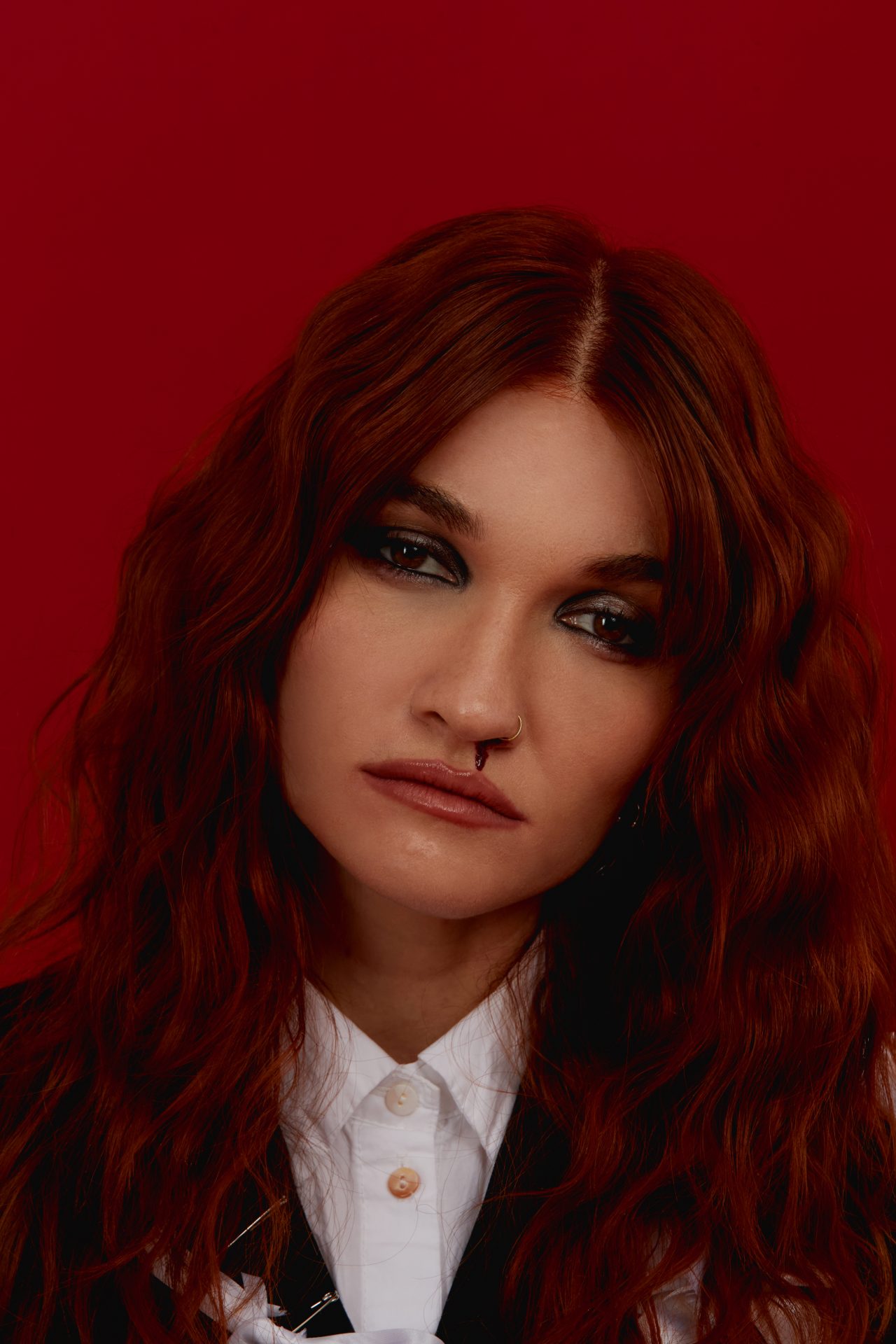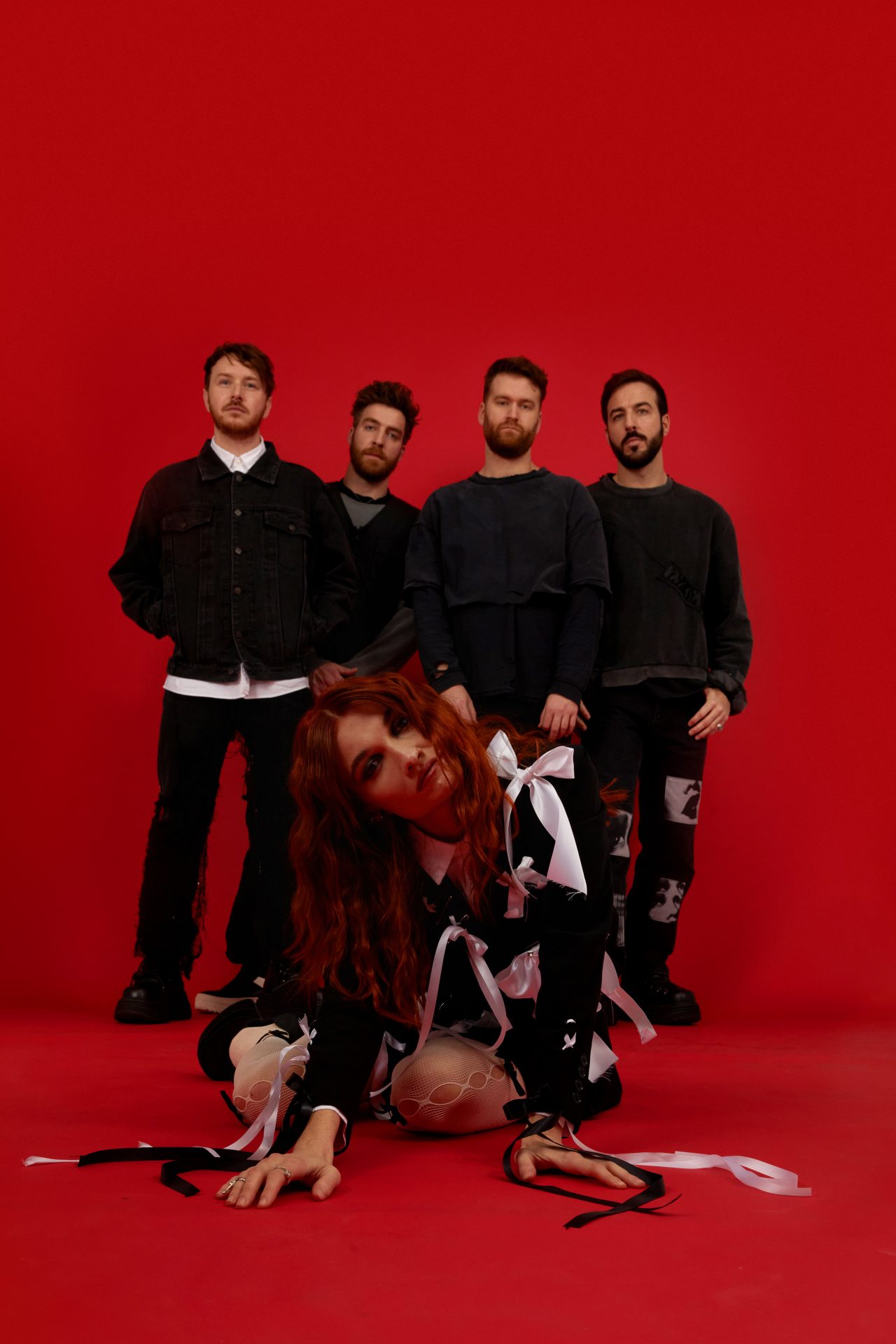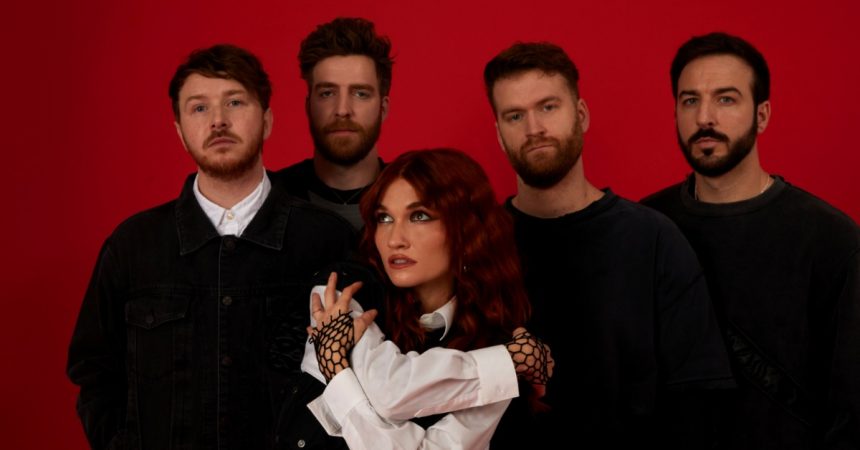There’s something different about MisterWives — and it’s not just their new monochromatic color palette. With their fourth studio album, Nosebleeds, the New York band have become even more self-assured and unwavering in their art by allowing themselves to throw all the rules out the window.
Singer Mandy Lee admits to having hidden heavy messages in sugary pop songs in the past. However, Nosebleeds shows her unlearning coping mechanisms that don’t suit her anymore and coming face to face with herself. “I remember being like, ‘I’ve got to keep going until I get to the surface of what I’m actually feeling,’” she says.
Read more: Fan Poll: 5 best alternative songs of the summer
She embraced the discomfort and let it mold her, learning how to stay soft during hard times. Letting go of control allowed her to be guided by her emotions, rather than suffocated by them. What resulted was a fiercely resilient album, equal parts heartache and joy.
We sat down with Lee and drummer Etienne Bowler for a deep dive into Nosebleeds. Here’s what this new record means to them, in their own words.
The imagery for Nosebleeds is so unlike anything we’ve seen from MisterWives before; it’s darker, more violent. Talk me through your process of conceptualizing these visuals.
MANDY LEE: Visuals are so symbiotic with music. When I’m writing or recording, those things always work in tandem for me. For this record, the emotions were the compass for everything that feels different — from production to all of the imagery, the music videos, and even the color palette. I wanted it to be a stark contrast to what our last record was because it felt really fitting for where I was and what my experience was.

The music itself also points to a new direction for the band. There’s a harder edge to everything. Where does this stem from?
LEE: We’ve always had moments where there’s more aggression [in the music], but [we’ve] never let that fully unfold into the whole course of a record. [After] everything that has been these last few years and the punches we have faced, I wanted to show up honestly, with what my experience was and how I was feeling. To not feel like I had to rush to [be like], “Here’s the final product. Everything’s great! Now I’ve healed, and I’m fine.” It was in real time what I was going through, and [Nosebleeds] takes you on that journey.
Honestly, therapy was a huge thing that changed my life, and this past year, I started going, and that’s what helped me be honest and let things surface without having to mask it or be concerned that it’s not the narrative of what the band has been these last 10 years, or people are gonna feel like we’ve changed. Change is good. People are supposed to change and are supposed to evolve. Through the personal work I was doing, it helped me show all sides of myself and how multifaceted we are.
You once said these tracks were inspired by “the perfect storm for how bands fall apart,” but, incredibly, you didn’t. Why do you think that is?
LEE: There’s a few answers to that. Our friendship is one. The last record was about our divorce, and we were able to still navigate staying [in] a band and staying best friends and growing and healing together in real time. This record felt like survival for me. It made me feel how I felt when I was 16 and writing music for it to be cathartic and for me to get through the hard times. That felt like a North Star.
Then last, but definitely not least: our fanbase. The community is so special. It’s what kept us going and was the light at the end of the tunnel when everything felt impossible to keep moving forward. I think a lot of bands will spiral and fall apart — and that’s OK — but it just felt like we [had] to keep fighting through. There’s so much more of the story to be written. The community we have that has been with us through all these years and keeps growing, it’s unlike anything I’ve experienced, ever. I didn’t want to give up on them and give up on ourselves.
ETIENNE BOWLER: At the end of the day, we’re best friends, and we really love making music together. We weren’t ready to stop that.
Do you think really facing what you were going through also helped y’all to continue to work well together?
LEE: Yeah, for sure. If you can stay honest in music, that’s a huge reason to keep going. We’ve never approached music from the standpoint of trying to recreate whatever is trending in music or trying to write from experiences I haven’t had or trying to fit a mold and maybe what’s expected from me. Honesty is definitely a big compass and why we’ve kept going and how much we’ve evolved and grown and continue to do so, even in the moments where it doesn’t feel like we are.
How do you feel about the concept of change? Is it something you welcome with open arms or something you try to avoid at all costs?
LEE: Oh, I don’t think anybody likes change. I haven’t been like, “I love feeling this way!” Embracing it, because it’s just inevitable, creates less resistance. I have gone through a lot of change in my life. Moving out when I was 15 and getting emancipated, and still pursuing music… I think it’s gotten easier, but by no means is it easy. It has been a tool of survival, having peace about it.
As a band, we always wanted radio success. That’s been something we’ve been told every time by a label: “We can’t fit you in a box. You guys don’t sound like this one sound.” I went into [Nosebleeds] saying, “I don’t care about radio anymore. That’s not the goal. I just want to write what’s true to me and be proud of what I’ve made and be honest and have fun.” And now I go in the car, and I’ve heard “Nosebleeds” a couple of times every week. Surrendering makes so much more space for other opportunities that you wouldn’t even realize if you were so tightly grasping onto what you want to happen.
It’s like when you want something so badly that the universe refuses to give it to you.
BOWLER: So true. I was in music for [at least] 10 years prior to starting this band with Mandy, and I had actually decided to give up on music. I started working for my dad’s company, and a year in, I was like, “I’m done with music. It’s too stressful. It’s not working out.” Then MisterWives was created, and I had to totally pivot my life’s plan. When you’re not looking for it, it finds you.
If you could go back to the beginning of this creative process and tell yourself anything, what would it be?
LEE: It’s so funny that “Nosebleeds” was one of the first songs I wrote for the album, and I didn’t finish it. I was so deep in heartache and feeling lost and feeling like the sky was falling every day. I was holding back tears while recording the song. It took me a year later to revisit the song to realize this song is amazing. It became the backbone of the record.
To tell Mandy in the studio in 2021: “This song? You’re gonna hear this on the radio,” I would not believe you at all, not for a second. Everything felt like we were starting over again. I had such a paradigm shift of people I trusted telling me I wasn’t good enough and I wasn’t gonna make it and our last record was a failure. All that stuff really started to permeate and make me feel like I couldn’t trust my voice anymore. You start to believe those doubters.
So to tell myself to believe in me, to have embodiment over who I am, and the power and strength to keep going would feel amazing at a time that felt really hopeless for me to keep pushing forward.

So you’re in the studio making Nosebleeds, and you’re having all these self-doubts — when does everything shift?
LEE: I feel like “Out Of Your Mind” was one where I felt [like], “OK, we’re not doing the same thing anymore. The change is happening.” It scared me — oh, my God did that song scare me. I remember feeling like, “Oh fuck, I really like this, but this is too insane to put out as a MisterWives [track].”
BOWLER: We had talked about, “Should we make another version of the song and make it more accessible?”
LEE: Oh, God. I’m so happy we didn’t. That was such an important moment, and the rest of the album followed suit. Everything else was [about] how much more can we push ourselves? How much more can we step out of the comfort zone and be comfortable in the discomfort and let the creativity and emotion really be what guides us, versus getting hung up on what’s ahead or what’s going to be the single or what are people going to want from us.
BOWLER: It doesn’t matter whether people hate this or like this — we love it, and that’s all that matters.
LEE: “Out Of Your Mind” was that pivotal moment where we gave ourselves permission to throw all the rules out the window.









